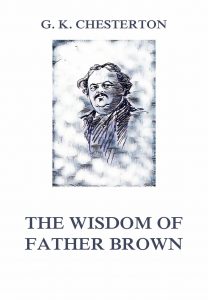The Wisdom of Father Brown – Gilbert Keith Chesterton
The small Catholic priest at his best again! Talcs of crime and discovery, clues and false leads and all the rest of the thrilling material which will make any normal human being sit up and keep on sitting up long past the proper hour for bed. The stories deal with the different strata of society, from the ventriloquist (in a London lodging house, who was found tied and apparently gagged, but instead of being the victim of a supposed murderer, was simply interrupted in his secret practice of new tricks) to the mysterious death of a celebrated actress almost in the presence of her five suitors, and the death of a German prince in his forest. Each story is utterly different from the others and each is told with the author’s gift to create atmosphere and to keep the reader intensely entertained.

The Wisdom of Father Brown
Format: Paperback
The Wisdom of Father Brown.
ISBN: 9783849677800.
Available at amazon.com and other venues.
Biography of Gilbert Keith Chesterton (from Wikipedia):
Gilbert Keith Chesterton, KC*SG (29 May 1874 – 14 June 1936), better known as G. K. Chesterton, was an English writer, poet, philosopher, dramatist, journalist, orator, lay theologian, biographer, and literary and art critic. Chesterton is often referred to as the “prince of paradox”. Time magazine has observed of his writing style: “Whenever possible Chesterton made his points with popular sayings, proverbs, allegories—first carefully turning them inside out.”
Chesterton is well known for his fictional priest-detective Father Brown, and for his reasoned apologetics. Even some of those who disagree with him have recognised the wide appeal of such works as Orthodoxy and The Everlasting Man. Chesterton routinely referred to himself as an “orthodox” Christian, and came to identify this position more and more with Catholicism, eventually converting to Catholicism from High Church Anglicanism. George Bernard Shaw, his “friendly enemy”, said of him, “He was a man of colossal genius.” Biographers have identified him as a successor to such Victorian authors as Matthew Arnold, Thomas Carlyle, Cardinal John Henry Newman, and John Ruskin.
(The text of the last section was taken from a Wikipedia entry and is available under the Creative Commons Attribution-ShareAlike License.)
Publisher’s Note: This book is printed and distributed by Createspace a DBA of On-Demand Publishing LLC and is typically not available anywhere else than in stores owned and operated by Amazon or Createspace.
